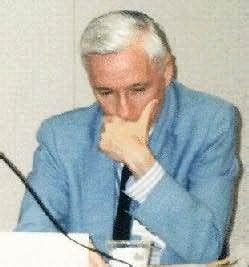A Quote by Henri Nouwen
The real question is: how can I live so that my death will be fruitful for others?
Related Quotes
Let's start with Jesus' answer: "Look for the kingdom first and all else will come together." Life is fragmenting, fragmented. I have a thousands things to do, others do too. We can live our life as if the main question is, "How can keep it together? How do I juggle all the balls? But the real question is, "How can I stay home - interiorly home - while I do these many things?
But how to know the falsity of death? How can we know there is no death? Until we know that, our fear of death will not go either. Until we know the falsity of death, our lives will remain false. As long as there is fear of death, there cannot be authentic life. As long as we tremble with the fear of death, we cannot summon the capacity to live our lives. One can live only when the shadow of death has disappeared forever. How can a frightened and trembling mind live? And when death seems to be approaching every second, how is it possible to live? How can we live?
Do not ask the stones or the trees how to live, they can not tell you ; they do not have tongues; do not ask the wise man how to live for, if he knows , he will know he cannot tell you; if you would learn how to live , do not ask the question; its answer is not in the question but in the answer, which is not in words; do not ask how to live, but, instead, proceed to do so.
How we view ourselves can often determine the perspective and degree in which we see others and the world around us. Each and every one of us has a view. Such a view, that it can shape the future of others and how they live, dream and look towards the future that we all hope is better and more fruitful than our past. This I believe is a common initiative.
I think we live in slavery to fear. Most people don't have an answer to the death question and really don't even have a philosophy. That is a puzzle to me. I think even if I was not a Christian, I would want to at least have a personal solution to the death question. Otherwise, death is just a frightening thing.
If you start parsing the cause-and-effect chain backward through time, eventually you land in cosmology - does the story begin with the Big Bang or the out-of-nothing creation of the world by the word of a Southern Baptist god? And that question is even more fraught than any of the others. The stakes couldn't be any higher, because not it's not just a question of life and death, but also a question of life after death or eternal torture after death.
They alone live whose lives are in the whole universe, and the more we concentrate our lives on limited things, the faster we go towards death. Those moments alone we live when our lives are in the universe, in others; and living this little life is death, simply death, and that is why the fear of death comes.
Because of my experience in Occupy, instead of asking the question, "Who will benefit from this system I'm implementing with the data?" I started to ask the question, "What will happen to the most vulnerable?" Or "Who is going to lose under this system? How will this affect the worst-off person?" Which is a very different question from "How does this improve certain people's lives?"
The issue is not whether there are horrible cases where the penalty seems "right". The real question is whether we will ever design a capital system that reaches only the "right" cases, without dragging in the wrong cases, cases of innocence or cases where death is not proportionate punishment. Slowly, even reluctantly, I have realized the answer to that question is no- we will never get it right.
































